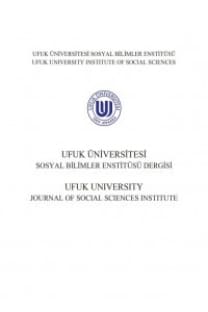AVRUPA BİRLİĞİ’NDE FİKİRSEL SOSYALLEŞME SÜRECİ
Bu araştırmanın amacı, Avrupa Birliği kurumlarında çalışan ulusal temsilcilerin sosyal öğrenme süreçlerine ışık tutmaktır. “Sosyal öğrenme süreci” şeklinde nitelenen olay, ulusal temsilcilerin AB kurumlarındaki görevleri süresince öğrendikleri yeni fikirleri, normları, çalışma ve karar alma yöntemlerini, ve bunların sonucunda değişen çıkarları ile rol ve kimlik anlayışlarını kapsamaktadır17. Bu araştırmanın deneysel çalışma boyutunda Avrupa Parlamentosu’nda görevli olan Türk kökenli bir Alman milletvekili ile yapılan röportaj çerçevesinde sorulan sorular ile “sosyal öğrenme” süreçleri ve yöntemlerinin deneysel olarak test edilmesi amaçlanmaktadır. Bu deneysel çalışma sonucunda elde edilen veriler sosyal yapısalcı teorinin soyut olması ve test edilememesi yönündeki eleştirileri18 karşılayacak ve böylelikle bu teoriye önemli bir deneysel katkı sağlayacaktır
Anahtar Kelimeler:
Sosyal yapısalcılık, fikirsel sosyalleşme, sosyal öğrenme, Avrupa Birliği
IDEATIONAL SOCIALIZATION IN THE EUROPEAN UNION
Inside EU institutions, national officials are subject to a shared system of rules, norms, principles and codes of conduct which they induct, internalize and take for granted. Ideational socialization or social learning implies a social process through which agent properties and preferences change as a result of interaction. In other words, institutional and normative environments have transformative effects on basic actor properties, including how individuals see themselves conceptions of the self/identity and how they conceptualize their interests. This research provides an analysis of the socialization effect of the EU institutions on a national representative of a member country, i.e. Germany, but who is originally from a candidate country, i.e. Turkey. The empirical study of this research aims at meeting the criticisms about the inability of most social constructivist studies to offer testable hypotheses and methods to test these hypotheses19. In this way, it aims to fill a gap in the social constructivist scholarship
___
- Andrew Moravcsik, “Is Something Rotten in the State of Denmark? Constructivism and European Integration”, Journal of European Public Policy, Cilt 6, No 4, 1999.
- Jan Beyers, “Multiple Embeddedness and Socialization in Europe: The Case of Council Officials”, International Organization, Cilt 59, No 4, 2005.
- Jan Beyers, “How Supranational is Supranationalism? National and European Socialization of Negotiators in the Council of Ministers”, Acta Sociologica, Cilt 33, No 4, 1998.
- Jarle Trondal, “Is the European Commission a “Hothouse” for Supranationalism? Exploring Actor-Level Supranationalism”, Journal of Common Market Studies, Cilt 45, No 5, 2007.
- Jarle Trondal, Beyond the EU Membership-Non-Membership Dichotomy? Explaining Supranational Identities Among EU Decision-Makers, Oslo, ARENA Working Papers, No 5, 2001.
- Jarle Trondal, “Integration Through Participation: Introductory Notes to the Study of Administrative Integration”, European Integration Online Papers, Cilt 3, No 4, 1999
- Jefry Checkel, “International Institutions and Socialization in Europe: Introduction and Framework”, International Organization, Cilt 59, No 4, 2005.
- Jeffrey Checkel, “Going Native in Europe?: Theorizing Social Interaction in European Institutions”, Comparative Political Studies, Cilt 36, No 1-2, 2003.
- Jeffrey Checkel, “The Europeanization of Citizenship?” Thomas Risse et al.(der.), Transforming Europe: Europeanization and Domestic Change, New York, Cornell University Press, 2001
- Johan P. Olsen, The Many Faces of Europeanization, Oslo, ARENA Working Papers, No. 2, 2001
- Liesbert Hooghe, “Several Roads Lead to International Norms, but Few Via International Socialization: A Case Study of the European Commission”, International Organization, Cilt 59, No 4, 2005.
- Morten Egeberg ve Jarle Trondal, “Differentiated Integration in Europe: The Case of EEA Country: Norway”, Journal of Common Market Studies, Cilt 37, No 1, 1999.
- Pernille Rieker, “Europeanization of Nordic Security: The European Union and the Changing Security Identities of the Nordic States”, Cooperation and Conflict, Cilt 39, No 4, 2004.
- Peter M. Haas, “Introduction: Epistemic Communities and International Policy Coordination”, International Organization, Cilt 46, 1992.
- Tanja A. Börzel ve Thomas Risse, “Conceptualizing the Domestic Impact of Europe” Kevin Featherstone, ve Claudio M. Radaelli (der.), The Politics of Europeanization, Oxford, Oxford University Press, 2003
- Thomas Risse, “A European Identity? Europeanization and the Evolution of Nation-State Identities”, Thomas Risse et al.(der.), Transforming Europe: Europeanization and Domestic Change, New York, Cornell University Press, 2001
- ISSN: 2146-7676
- Başlangıç: 2011
- Yayıncı: Ufuk Üniversitesi
Sayıdaki Diğer Makaleler
AVRUPA BİRLİĞİ’NDE FİKİRSEL SOSYALLEŞME SÜRECİ
Küreselleşen Yaşlılık ve Yaşlı Bakım Üzerine Eleştirel Bir Yaklaşım
Dünya Ekonomisindeki Değişimin Çok Uluslu Şirketler Üzerindeki Yansımaları
Avrupa Birliği Ülkelerinde Bölgelerarası Gelişmişlik Farklarını Azaltıcı Önlemler
DÜNDEN BUGÜNE TÜRKİYE-RUSYA EKONOMİK İLİŞKİLERİNDE ÜÇ BÜYÜK DÖNEM
